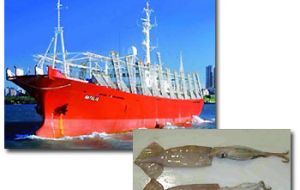MercoPress. South Atlantic News Agency
Argentina faces the worst squid season in years
 Most jiggers are back in port, while a few still catching are betting on higher prices in the near future.
Most jiggers are back in port, while a few still catching are betting on higher prices in the near future. With only two weeks left, Argentina is facing the worst squid season in years forcing jiggers to abandon the fisheries given the poor catches.
According to official statistics from the Secretary of Agriculture, Livestock, Fisheries and Food, catches to the first week of August totalled 47.504 tons, when in the previous three seasons the volume was over 200.000 tons.
Reports indicate that most Argentine licensed jiggers are back in port while only a few remain at sea. Apparently they belong to big companies and are betting on an increase in squid prices because of the limited supply that can be expected from this season.
“This season is over and is the worst we recall in recent memory. Some companies are still trying to catch because of better prices and hoping to cut their losses”, said Fernando Georgiadis, president of the Argentine Chamber of Jiggers, CAPA.
“This has been a most distorted season, the worst since 1993; to the south, squid did not turn up and to the north, there was some but the size too small”, added Georgiadis. North and south squid fisheries are defined by parallel 44o south.
“We all know that squid is a species highly susceptible to oceanographic changes” and therefore it’s virtually impossible to advance forecasts for the next season.
Georgiadis added that faced with such a situation it is “crucial” for the (Argentine) government to eliminate duties on squid exports, “or reduce them or suspend them”.
“We believe it is essential that fisheries be included in the congressional agenda, so far it has been only problems with farmers, but the fishing industry is also facing a dramatic situation”, pointed out CAPA’s president.
Georgiadis added that squid catches in the high seas and in the Argentine zone under foreign control have also been “dismally poor”.
According to Argentine statistics in 1993 landings totalled, 185.490 tons; 1994, 189.227 tons; 1995, 188.442 tons; 1996, 245.754 tons; 1997, 335.765 tons; 1998, 256.847 tons; 1999, 290.835 tons; 2000, 248.679, tons; 2001, 208.395 tons; 2002, 153.935 tons; 2003, 127.057 tons; 2004, 65.773 tons; 2005, 123.785 tons; 2006, 260.944; 2007, 204.008 tons and last year 229.617 tons.




Top Comments
Disclaimer & comment rulesCommenting for this story is now closed.
If you have a Facebook account, become a fan and comment on our Facebook Page!